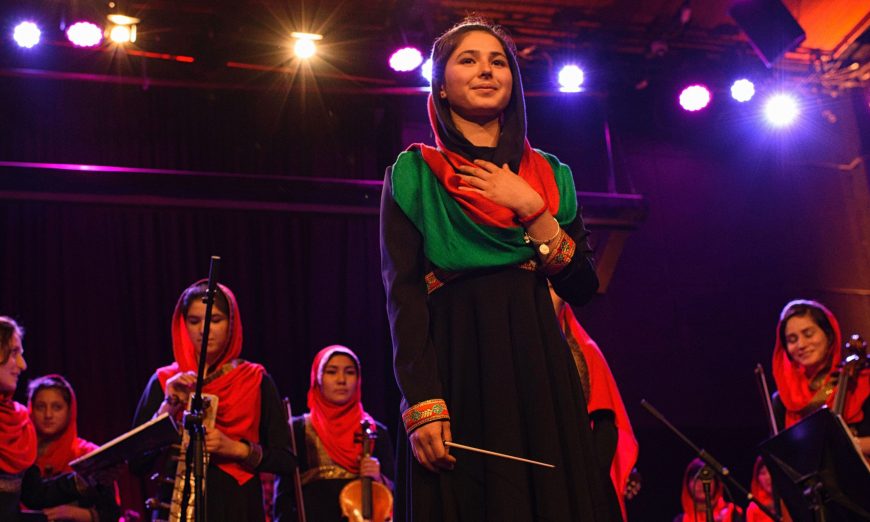Zohra’s musicians are the first women in their families, communities and country to study music in over 30 years. They come from provinces all across Afghanistan to live in Kabul and study at the Afghanistan National Institute of Music, founded by Dr. Ahmad Sarmast. Among Zohra’s ranks are the country’s first female conductors, NeginKhpalwak and ZarifaAdiba.
ANIM was first opened in 2010 by Ahmad Naser Sarmast, the current director, although its history goes back even further. The institute is rekindling a musical teaching tradition that was severely weakened over the course of recent political upheavals. With the original creation of the music school in 1974, music became a part of the national curriculum in Afghanistan. The school held classes until 1988 when it closed due to the war, and it then stayed shut throughout the rule of the Taliban, since music was made illegal.
The school reopened its classrooms when Hamid Karzai, the former president of Afghanistan, came to power. In 2008, Ahmad Naser Sarmast began a project called the ‘Reconstruction of Aghan Music,’ which was funded by the World Bank. Two years later, the music school became ANIM and began teaching courses in both classical western and eastern music. These include lessons in the violin, viola, guitar, piano, trumpet and flute, as well as more traditional instruments like the robab, ghickak, tambour drum, qashqarcha, the three-stringed sarod, and the delroba.
Currently ANIM has around 250 students, including 75 girls. From these ranks, these young women have pooled together their respective talents to form the Zohra Orchestra: the first Afghan orchestra made up exclusively of girls. Started in 2014, this musical group held its first event at the Canadian Embassy in Kabul: not exactly a small-town crowd.
Every year, between 300 and 400 applicants take the institute’s entrance exam and only 50 of them are offered places. Around 50% of the candidates are homeless or orphaned children and are put forward by NGOs working on children’s rights in Afghanistan. As well as the Zohra Orchestra, the institute has eleven other music groups.
At the Afghanistan National Institute of Music, both rich students and orphans attend music classes under the same roof. They express their emotions – whether that means pain, hope, joy or grief – through music, so that one day they will be able to fulfil their childhood dreams.
As per the Founder and Director of ANIM, Ahmad Naser Sarmast, “The Afghanistan National Institute of Music is like an island of hope in the dark. This institute is the symbol of the Afghanistan of tomorrow.”
These are students of the Afghanistan National Institute of Music (ANIM), founded by Dr. Ahmad Sarmast under jurisdiction of the Ministry of Education. These brave girls are the first women in their families, communities, and country to learn music in over thirty years.
A ray of hope to many, ANIM provides music and general education to hundreds of Afghan children regardless of their gender, ethnicity, religious affiliation, or socio-economic circumstances. Within this co-educational environment — a rarity in Afghanistan — one of ANIM’s leading com-mitments is to empower girls through music. Since its inaugural days in 2010, the enrolment of girls has risen to one-third of the student body and they have become an integral and important part of both the academic and social framework of the school. Thirty of these remarkable students are members of the Zohra Orchestra.
In early 2015, the Zohra Orchestra was formed. Initially a small group of four girls, it soon grew into what is now a twenty-nine-piece orchestra, comprised of both Western classical and traditional Afghan instruments. In 2017, after two years of dedicated work, Zohra Orchestra embarked on their first international tour; they performed in four cities be-tween Germany and Switzerland, with a highlighted performance at the closing ceremony of the World Economic Forum in Davos, Switzerland.
Support from international community to this brave team:
Deeply inspired by Zohra’s story, the World Economic Forum offered to be a platform for the ensemble to write the next chapter in its incredible story, and so it invited Zohra to perform at the Annual Meeting in Davos.In early 2016, the Forum’s team rapidly began mobilizing resources for Zohra’s visit. The Italian bank Intesa Sanpaolo sponsored the project, which secured core funding for production and flights from Kabul. The Forum then reached out to other partners in Europe to organize Zohra’s inaugural international tour; the ensemble would embark on a 20-day journey with 11 concerts in five cities. In Switzerland and Germany, they would share the stage with local youth orchestras in the spirit of intercultural dialogue.
In Kabul, ANIM painstakingly secured permission slips for travel from each parent, and special government passports for each student and their chaperones. The visa application process was complex: Europe was tightening its rules during the throes of the refugee crisis, and getting visas for Afghans was difficult. Officials feared Afghan nationals would seek asylum once abroad. The World Economic Forum provided guarantees and submitted the paperwork. In the nick of time, one month before the tour, the German embassy in Kabul granted all applicants visas. Relief was as palpable in Kabul as at the World Economic Forum’s HQ in Geneva.
Partners in Europe readied themselves to receive the girls. In Geneva, members of the Orchestre du College de Genève, a youth orchestra, rehearsed the Zohra’s music as the holiday season approached.
They would tour across Switzerland with them in the spirit of intercultural exchange. The stage in Davos would also be theirs. In Weimar, Germany, students of the Belvedere School of Music readied themselves too, learning about Afghanistan as well as its music and preparing to receive the Zohra for the concerts in Weimar and Berlin.

